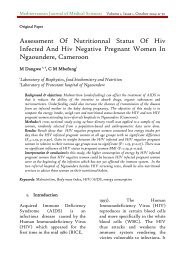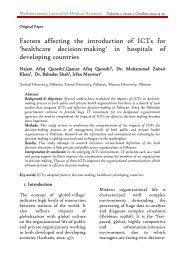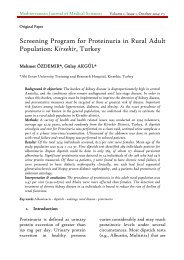Mediterranean Journal of Medical Sciences MJMS
Mediterranean Journal of Medical Sciences,aims to provide a platform for knowledge sharing among academicians, students, researchers, physicians, government entities and other non government entities. Issues : 3 per year ISSN 2385-2712 EISSN 2385-2453 http://mcmscience.org/
Mediterranean Journal of Medical Sciences,aims to provide a platform for knowledge sharing among academicians, students, researchers, physicians, government entities and other non government entities.
Issues : 3 per year
ISSN 2385-2712 EISSN 2385-2453
http://mcmscience.org/
Create successful ePaper yourself
Turn your PDF publications into a flip-book with our unique Google optimized e-Paper software.
N. A. Qureshi et al 27<br />
4. Discussion<br />
Generally, the energy intake by<br />
HIV infected pregnant women<br />
appears to be higher than that <strong>of</strong><br />
HIV negative pregnant women.<br />
This could be because HIV<br />
infected pregnant women were at<br />
the beginning <strong>of</strong> the infection<br />
which has not yet affected the<br />
immune system. It could be also<br />
due to the fact that there were not<br />
aware <strong>of</strong> their HIV status which<br />
could have affected their mind<br />
therefore influencing them to lose<br />
weight through their thoughts. A<br />
study reported that the quantity<br />
<strong>of</strong> energy necessary for pregnant<br />
women <strong>of</strong> the third trimester is<br />
2,250 kcal per day. However, a<br />
comparison <strong>of</strong> the energy taken by<br />
the HIV negative and HIV<br />
infected pregnant women in this<br />
study revealed that the energy<br />
levels were higher than values<br />
reported by Dupin and al<br />
(1992).This could be justified by<br />
the fact that these pregnant<br />
women were in the third trimester<br />
<strong>of</strong> pregnancy when they have the<br />
tendency <strong>of</strong> eating a lot<br />
irrespective <strong>of</strong> their HIV status.<br />
In our study group, we noticed<br />
that infected pregnant women and<br />
non infected pregnant women<br />
gain weight during pregnancy.<br />
We observe that the biggest mean<br />
rates <strong>of</strong> gain for 3 rd trimester <strong>of</strong><br />
pregnancy in our population<br />
group is 0,399kg/wk for HIV<br />
negative pregnant women and<br />
0,308 kg/wk for HIV infected<br />
pregnant women. The presumably<br />
gain weight from HIV-uninfected<br />
adult women from the United<br />
States and Europe are 0,30 to 0,54<br />
kg/wk during the 3 rd trimester.<br />
However, people on whom we<br />
worked have weight ranges these<br />
values. This result is similar to<br />
those reported by Strauss and al.<br />
(1999) and Ladner and al (1998),<br />
but contrasts that <strong>of</strong> Kim and al.<br />
(1996) who observed HIV<br />
infected subjects to be suffering<br />
from underfeeding and weight<br />
lost at the onset <strong>of</strong> the infection.<br />
The difference between our study<br />
and that observed by Kim et al.<br />
(1996) is that the subjects enrolled<br />
in our study were found to have<br />
more energy intake than the<br />
recommended<br />
energy<br />
consumption. The energy surplus<br />
consumed by these pregnant<br />
women would have compensated<br />
the expected weight. We did not<br />
find further evidence in the<br />
literature that suggested<br />
differences in the pattern <strong>of</strong><br />
weight gain by HIV status. But<br />
we know that lean body mass loss<br />
can be improved when nutrition<br />
counseling is combined with<br />
nutritional interventions (Stack<br />
and al.,1996). The body mass index<br />
observed in our study show that<br />
HIV status does not influence the<br />
http://www.mcmscience.org








